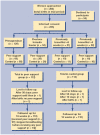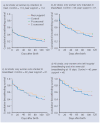The effect of a programme of organised and supervised peer support on the initiation and duration of breastfeeding: a randomised trial
- PMID: 16536959
- PMCID: PMC1828262
The effect of a programme of organised and supervised peer support on the initiation and duration of breastfeeding: a randomised trial
Abstract
Background: Peer support may improve breastfeeding rates but the evidence is inconclusive. Previous studies and reviews recommend trials in different healthcare settings.
Aim: To test if a specified programme of peer support affects the initiation and/or the duration of breastfeeding.
Design of study: A two-group randomised controlled trial of peer support for breastfeeding with evaluation of breastfeeding initiation and duration on an intention-to-treat basis.
Setting: General practice in Ayrshire, Scotland.
Method: Following informed consent, 225 women at 28 weeks gestation were allocated to control or peer support group by post-recruitment concealed allocation. All peer support and control group mothers received normal professional breastfeeding support. Additionally, those in the peer support group still breastfeeding on return home from hospital had peer support until 16 weeks.
Results: Thirty-five of the 112 (31%) women in the peer support group were breastfeeding at 6 weeks compared to 33/113 (29%) in the control group, a difference of 2% (95% confidence interval = -10% to 14%). The median breastfeeding duration for all women in the peer support group was 2 days compared to 1 day for the control group and the Kaplan-Meier survival plot shows the peer support group overall breastfeeding slightly longer than the control group, with no statistically significant difference by logrank test (P = 0.5). The median breastfeeding duration among primagravidae in the peer support group was 7 days, compared to 3 days for the control group. Among women who started to breastfeed the medians were 72 days in the peer support group and 56 days in the control group. These differences were not statistically significant.
Conclusions: Peer support did not increase breastfeeding in this population by a statistically significant amount.
Figures
Comment in
-
Peer support for breastfeeding in the UK.Br J Gen Pract. 2006 Mar;56(524):166-7. Br J Gen Pract. 2006. PMID: 16536954 Free PMC article. No abstract available.
-
Low breastfeeding rates and milk insufficiency.Br J Gen Pract. 2006 May;56(526):379. Br J Gen Pract. 2006. PMID: 16638259 Free PMC article. No abstract available.
-
Lay support for breastfeeding.Br J Gen Pract. 2006 Jun;56(527):461-2. Br J Gen Pract. 2006. PMID: 16762129 Free PMC article. No abstract available.
References
-
- Fairbank L, O'Meara S, Renfrew MJ, et al. A systematic review to evaluate the effectiveness of interventions to promote the initiation of breastfeeding. Health Technol Assess. 2000;4:25. - PubMed
-
- Sikorski J, Renfrew MJ, Pindoria S, Wade A. Cochrane Library. Issue 1. Oxford: Update Software; 2002. Support for breastfeeding mothers. In: Cochrane Review. - PubMed
-
- Protheroe L, Dyson L, Renfrew MJ, et al. The effectiveness of public health interventions to promote the initiation of breastfeeding. Evidence briefing. London: Health Development Agency; 2003.
-
- Morrow AL, Guerrero ML, Shults J, et al. Efficacy of home-based peer counselling to promote exclusive breastfeeding: a randomised controlled trial. Lancet. 1999;353:1226–31. - PubMed
Publication types
MeSH terms
LinkOut - more resources
Full Text Sources
Medical
Research Materials


